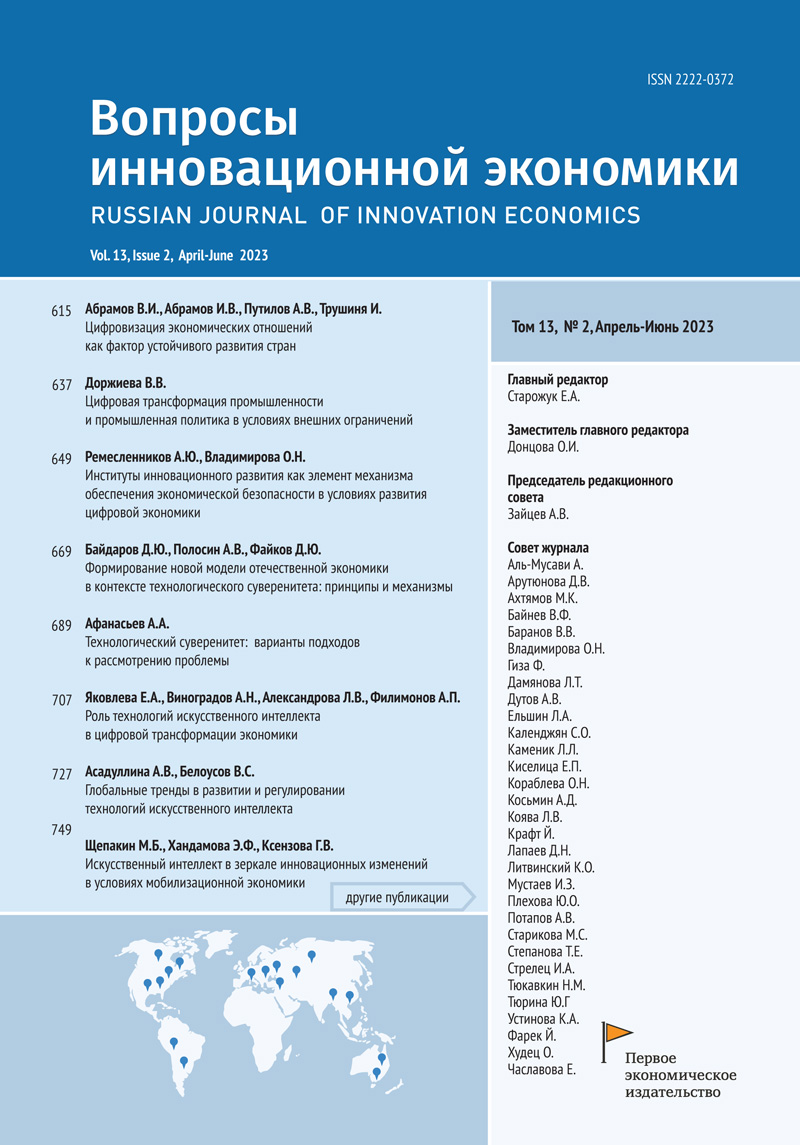Innovation as a factor for the further development of the Cooperation Council for the Arab States of the Gulf
- Autores: Prokopyev P.S.1
-
Afiliações:
- The Financial University under the Government of the Russian Federation
- Edição: Volume 13, Nº 2 (2023)
- Páginas: 1071-1086
- Seção: Articles
- URL: https://journals.eco-vector.com/2222-0372/article/view/608120
- DOI: https://doi.org/10.18334/vinec.13.2.117576
- ID: 608120
Citar
Texto integral
Resumo
The author analyzes the current stage of integration of the Cooperation Council for the Arab States of the Gulf. The main categories of factors hindering the deepening of economic integration in the region are identified. Economic, institutional and political factors are considered.An alternative model of deepening economic integration in the Cooperation Council for the Arab States of the Gulf is proposed. Economic integration in the Cooperation Council for the Arab States of the Gulf does not set the ultimate goal of forming an economic and monetary union. The model is based on horizontal integration. The goal of the proposed model is to coordinate economic policy measures at the supranational level in individual industries. It is proposed to pay special attention to the innovative development and implementation of innovative technology in key industries and areas of economic activity of the region. Increasing the level of innovation in the Arab Gulf energy sector, including increasing the role of renewable energy, industry and the transport and logistics industry, could contribute not only to deepening economic integration within the framework of the association, but also to creating conditions for more sustainable long-term development of the region.
Sobre autores
Pyotr Prokopyev
The Financial University under the Government of the Russian Federation
Email: prokopiev2012@gmail.com
Bibliografia
- Мельник М.Н. Проблемы введения единой валюты арабских монархий Персидского Залива // Вестник Московского университета. Серия 13. Востоковедение. – 2020. – № 4. – c. 99-111.
- Шкваря Л.В. Интеграция и дипломатический кризис: современные реалии ССАГПЗ // Вестник МГИМО-Университета. – 2020. – № 2. – c. 163-182.
- Шкваря Л. В. Интеграционные процессы в ССАГПЗ в условиях цифровизации // Экономика и предпринимательство. – 2020. – № 11(124). – c. 453-455.
- Cham T. Is the GCC an optimum currency area (OCA)? Empirical answers from co-movements // International Journal of Islamic and Middle Eastern Finance and Management. – 2020. – № 5. – p. 873-890.
- Ahmad W. Common Currency Area in GCC Region: An Application of Euro Model // American Journal of Industrial and Business Management. – 2021. – № 8. – p. 905-923.
- Titievskaia J., Kononenko V., Navarra C. Slowing down or changing track?. European Parliamentary Research Service. [Электронный ресурс]. URL: https://www.europarl.europa.eu/RegData/etudes/IDAN/2020/659383/EPRS_IDA(2020)659383_EN.pdf (дата обращения: 20.12.2020).
- Takagi S. Establishing Monetary Union in the Gulf Cooperation Council: What Lessons for Regional Cooperation?. ADBI Working Paper Series. [Электронный ресурс]. URL: https://www.adb.org/sites/default/files/publication/156245/adbi-wp390.pdf. (дата обращения: 12.12.2021).
- Al-Mawali N. Ntra-Gulf Cooperation Council : Saudi Arabia Effect // Journal of Economic Integration. – 2015. – № 3. – p. 532-552.
- Bechri M.Z. Gulf economies should use the available fiscal space to ensure a soft landing. Middle East Institute Policy Research. [Электронный ресурс]. URL: https://www.mei.edu/publications/gulf-economies-should-use-available-fiscal-space-ensure-soft-landing (дата обращения: 09.08.2022).
- Magazzino C. Fiscal sustainability in the GCC countries // International Journal. – 2022. – № 16. – p. 389–408.
- Украинцев А.А. Проблемы интеграции и регионализации в ССАГПЗ // Экономика: вчера, сегодня, завтра. – 2018. – № 8. – c. 324-333.
- Mishrif A. The GCC's Unsettled Policy for Economic Integration // The Muslim World. – 2021. – № 1. – p. 70-95.
- Regional Integration and Development. World Bank Publications. [Электронный ресурс]. URL: https://documents1.worldbank.org/curated/en/263681468780873762/pdf/multi0page.pdf (дата обращения: 18.03.2023).
- Al-Ubaydli O. GCC Single Market Failure: Problems And Solutions. MEES Publications. [Электронный ресурс]. URL: https://www.mees.com/2014/2/14/op-ed-documents/gcc-single-market-failure-problems-and-solutions/c3d31d80-6574-11e7-81ba-dbfa82334759 (дата обращения: 14.02.2014).
- Ulrichsen K.C., Harb I.K., Jahshan K.E. The GCC Reconciliation: An Assessment. Arab Center Washington DC Publications. [Электронный ресурс]. URL: https://arabcenterdc.org/resource/18767/ (дата обращения: 11.01.2021).
- Князев Ю.К. О многообразии моделей экономической интеграции // Свободная мысль. – 2021. – № 5. – c. 81-90.
- Шкваря Л. В. Инновационная составляющая экономики стран ССАГПЗ // Инновационная экономика. – 2018. – № 1(14). – c. 1-11.
- Исаев М.Н. Инновационное развитие стран Персидского Залива: современное положение // Горный информационно-аналитический бюллетень. – 2013. – № 12. – c. 327-331.
- 2022 Report. Global Innovation Index. [Электронный ресурс]. URL: https://www.globalinnovationindex.org/gii-2022-report# (дата обращения: 18.03.2023).
- OECD Main Science and Technology Indicators March 2021. OECD Directorate for Science, Technology and Innovation. [Электронный ресурс]. URL: https://www.oecd.org/sti/msti-highlights-march-2022.pdf (дата обращения: 18.03.2023).
- Berglind N., Fadia A., Isherwood T. McKinsey Research : электронный журнал. [Электронный ресурс]. URL: https://www.mckinsey.com/industries/public-and-social-sector/our-insights/the-potential-value-of-ai-and-how-governments-could-look-to-capture-it. (дата обращения: 25.07.2022).
- Innovating through tech in the GCC. The Economist Intelligence Unit. [Электронный ресурс]. URL: https://impact.economist.com/perspectives/sites/default/files/eiu_bahrain_edb_report.pdf (дата обращения: 18.03.2023).
- Elrahmani A., Hannun J. Status of renewable energy in the GCC region and future opportunities // Current Opinion in Chemical Engineering. – 2021. – № 31. – p. 1-12.
- The Push For Alternative Energy In The GCC. Hammad Al-Mehdar Research. [Электронный ресурс]. URL: https://hmco.com.sa/the-push-for-alternative-energy-in-the-gcc/ (дата обращения: 18.03.2023).
- Аль-Убайдли О. Почему страны Персидского залива за зелёную экономику?. МДК Валдай. [Электронный ресурс]. URL: https://ru.valdaiclub.com/a/highlights/strany-persidskogo-zaliva-za-zelyenuyu-ekonomiku/ (дата обращения: 15.09.2021).
- Road development continues to be top priority for GCC with projects worth more than USD 122 billion. Orient Planet Group. [Электронный ресурс]. URL: https://orientplanet.com/PressReleasesGCCRoadDev.html (дата обращения: 18.03.2023).
- Putting GCC transportation and logistics in the driver’s seat. Strategy Publications. [Электронный ресурс]. URL: ttps://www.strategyand.pwc.com/m1/en/reports/putting-gcc-transportation-and-logistics-in-the-drivers-seat.pdf (дата обращения: 18.03.2023).
- Balasubramanian P. The GCC Railway: Could it Remain Rhetoric?. The Kootneeti. [Электронный ресурс]. URL: https://thekootneeti.in/2020/07/30/the-gcc-railway-could-it-remain-rhetoric/ (дата обращения: 30.07.2020).
- Israel official reveals mega railway project to UAE. Middle East Monitor. [Электронный ресурс]. URL: https://www.middleeastmonitor.com/20210322-israel-official-reveals-mega-railway-project-to-uae/ (дата обращения: 18.03.2023).
Arquivos suplementares









